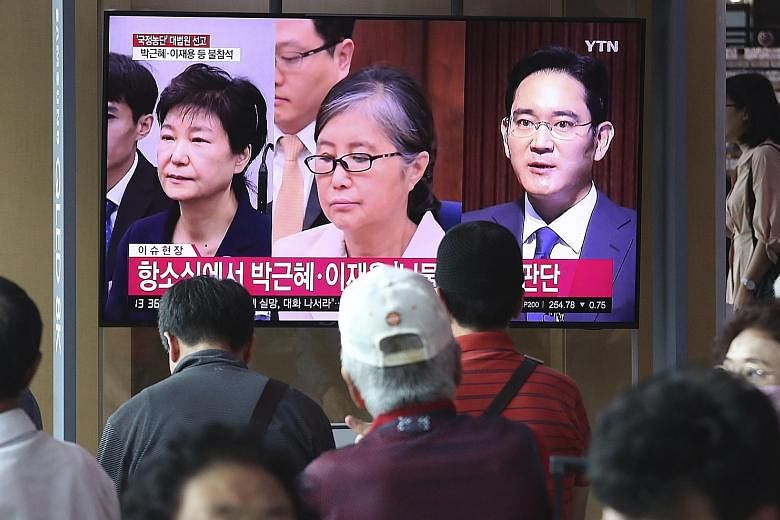SEOUL • South Korea's Supreme Court yesterday ruled that a bribery case against the heir of the Samsung Group should be reviewed by a lower court, raising the possibility of a tougher sentence and potential return to jail.
The Supreme Court overturned part of an appeals court bribery conviction against Samsung's de facto chief Lee Jae-yong, who had been given a 21/2-year suspended sentence for seeking favour from the country's former leader.
The court said the interpretation by the Seoul High Court on what constituted bribes by Samsung to then-President Park Geun-hye was too narrow, and returned the case to the appellate court.
The case against Lee centred on whether three horses donated by Samsung Group for the training of the daughter of Park's confidante Choi Soon-sil should be considered bribes aimed at winning the then-President's favour in the conglomerate's succession planning.
"The court overturned the part of the appeals court rulings that found him not guilty. That means it is inevitable he will get a heavier sentence," said attorney Choi Jin-nyoung, who is not involved in the case.
A sentence of more than three years would mean immediate incarceration as a suspension of sentence is permitted only for terms of up to three years under South Korean law.
Court documents show that Park asked Lee to help Choi's daughter, a competitive equestrian. He was convicted on grounds that the horses were bribes worth around 3.7 billion won (S$4.2 million). But the horses were not recognised as such in Lee's trial, which helped to reduce his sentence.
The Supreme Court said the appeals court erred in not recognising the horses as bribes given by Samsung to win favours.
-
The case
-
HOW IS SAMSUNG INVOLVED?
In late 2016, prosecutors arrested Park Geun-hye's friend Choi Soon-sil on suspicion of exerting inappropriate influence over state affairs after the president allowed Choi to edit draft speeches.Court documents show that Park pressed conglomerates including Samsung Group to make donations to Choi-backed foundations and separately asked Samsung to support the equestrian training of Choi's daughter.
Park was impeached in March 2017, making her the country's first democratically elected leader to be ousted from office. She denied wrongdoing.
Samsung heir Lee Jae-yong had been arrested a month earlier, accused of seeking presidential favours in exchange for extending Choi financial support. Samsung and Lee denied wrongdoing.
-
WHAT ARE THE STICKING POINTS?
The case centres on whether three horses donated by Samsung for the training of Choi's daughter should be considered bribes aimed at winning Park's favour.Court documents show Park had asked Lee to help the daughter; he was convicted on grounds that the horses were bribes. But the horses were not recognised as such in Lee's trial, which helped to reduce his sentence.
-
WHAT DOES IT MEAN FOR SAMSUNG?
Lee is poised to take control of the Samsung Group from his aged father. His titles include vice-chairman of Samsung Electronics, the world's biggest maker of smartphones and memory chips.Samsung Electronics is battling falling profitability as prices of chips and display panels slide. It also has to contend with Japan's decision to restrict exports of chipmaking chemicals to South Korea following a diplomatic dispute.
REUTERS
Park was impeached in 2017 after weeks of street protests demanding her ouster for abuse of power and corruption.
The Supreme Court also ruled that the High Court had erred in its decision against Park on procedural points, ordering a review. But the review is unlikely to significantly alter the 25-year sentence she is serving.
The ruling yesterday cast doubt on whether the 51-year-old Lee can focus on steering the group's flagship Samsung Electronics through falling profitability and amid Japanese export curbs on materials crucial for the world's leading chipmaker.
Japan's decision last month to restrict exports of key chipmaking chemicals to South Korea following a diplomatic dispute threatens to disrupt the production of memory chips, South Korea's biggest export item.
Officials at Samsung are concerned about what Lee's absence would mean for key management strategies in a tougher business climate than when he was arrested in 2017, a person with knowledge of the matter told Reuters.
Lee, vice-chairman of Samsung Electronics, was sentenced in 2017 to five years in prison for bribing a friend of Park as he sought to succeed his father and strengthen control of Samsung Group.
He was freed after a year in detention when the appellate Seoul High Court halved his sentence and suspended it for four years. Both Lee, who denies wrongdoing, and prosecutors appealed.
Speaking to reporters after the ruling, Lee's lawyer denied that Samsung had received any favours from Park and said any payment made by the company was in response to a demand from the now-deposed leader, an argument that it had made during lower court trials.
"The Supreme Court decision is regrettable in the sense that it found providing financial support at the demand of the president constituted a bribe," said lawyer Lee In-jae. "The defendant feels very sorry to have caused disappointment and concern to many over this matter."
REUTERS

